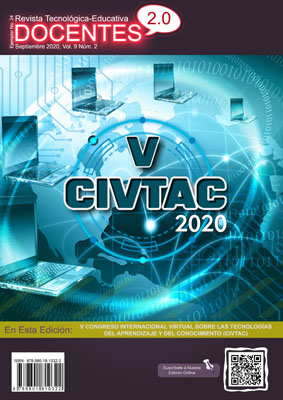The Influence of Reuven Feuerstein's Application of the Theory of the Experience of Learning on the Strengthening of the Reading and Writing of Sixth Grade Students
 DOI:
https://doi.org/10.37843/rted.v9i2.162
DOI:
https://doi.org/10.37843/rted.v9i2.162
Main Article Content
Abstract
The influence of the Theory called “Reuven Feuerstein's Mediated Learning Experience” modifies the nature of the interaction whose purpose is to strengthen the literacy of sixth-grade students at the El Tropezón Rural Education Center in the municipality of La Esperanza, located in the North of Santander. This study was carried out through Action Research with a mixed approach, for this, initially, a diagnostic evaluation was applied in order to establish the students' prior knowledge of the area of ??literacy, finding deficiencies in different proposed achievement indicators by the Ministry of National Education, for which a pedagogical proposal is designed integrating the theoretical foundations, the cognitive functions and the mental operations in the reading and writing competence through the methodology of the entrance, elaboration and exit phases, proposed in this theory . This proposal allowed the medication in the teaching-learning process of 20 students, carried out in two months with a distance modality due to the mandatory confinement by the COVID19, period which evidenced the consolidation of the literary-writer where it was observed that 80% of the students they had an improvement in the selected achievement indicators.
Downloads
Metrics
Article Details

This work is licensed under a Creative Commons Attribution-NonCommercial-NoDerivatives 4.0 International License.
Those authors who have publications in our journal accept the following terms:
- When a work is accepted for publication, the author retains rights of reproduction, distribution of his/her article for exploitation in all countries of the world in the format provided by our magazine and any other magnetic medium, optical, and digital.
- Authors will retain their copyright and guarantee the journal the right first to publish their work, which will be simultaneously subject to the Creative Commons Acknowledgment License (Attribution-NonCommercial-NoDerivatives 4.0 International (CC BY-NC-ND 4.0)). That allows third parties to copy and redistribute the material in any medium or format, under the following conditions: Acknowledgment - You must properly acknowledge authorship, provide a link to the license, and indicate if any changes have been made. You may do so in any reasonable way, but not in a way that suggests you have the licensor's endorsement or receive it for your use. NonCommercial - You may not use the material for a commercial purpose. NoDerivatives - If you remix, transform, or build from the material, you cannot broadcast the modified material. There are no additional restrictions - You cannot apply legal terms or technological measures that legally restrict you from doing what the license allows.
- Authors may adopt other non-exclusive license agreements to distribute the published version of the work (e.g., deposit it in an institutional archive or publish it in a monographic volume) provided that the initial publication in this journal is indicated.
- Authors are allowed and recommended to disseminate their work through the Internet (e.g., in institutional telematic archives, repositories, libraries, or their website), producing exciting exchanges and increasing the published work's citations.
- Request of withdrawal an article has to be done in writing by the author to the Editor, becoming effective after a written response from the Editor. For this purpose, the author or authors will send correspondence via e-mail: [email protected].
- The author will not receive financial compensation for the publication of his work.
- All Docentes 2.0 Journal publications are under the Open Journal System (OJS) platform at: https://ojs.docentes20.com/.
References
Carneiro, R., Toscano, J. C., & Díaz, T. (2011). Los desafíos de las TIC para el cambio educativo. Metas Educativas. Recuperado de http://www.oei.es/metas2021/LASTIC2.pdf
Cedillo, I. (2010). El aprendizaje mediado y las operaciones mentales de comparación y clasificación. Cuenca: Universidad de Cuenca. Recuperado de http://dspace.ucuenca.edu.ec/handle/123456789/3296
Consultoría para los Derechos Humanos y el Desplazamiento – CODHES. (2017). Breve balance sobre los derechos de las víctimas en la implementación normativa del acuerdo de paz en Colombia. Bogotá: Programa de Participación y Reparación Colectiva a las Víctimas en Colombia.
Feuerstein, R. (1991). Modificabilidad Cognitiva y programa de enriquecimiento instrumental: Esquemas para la comprensión y práctica del modelo de Reuven Feuerstein. Instituto superior San Pio x.
Feuerstein, R. (1998). La Experiencia del Aprendizaje Mediado y las categorías de mediación. Cánada: Universidad Diego Portales.
García, E. (2001). El arte de preguntar para enseñar y aprender mejor. Byblos, México D.F.
Hernández, S., Fernández, C., & Baptista, P. (2006). Metodología de la Investigación. México: Mc Graw Hill.
Herrera, Z. (2005). Aproximación a las teorías de la Modificabilidad Cognoscitiva Estructural y de la Experiencia del Aprendizaje Mediado del Dr. Reuven Feuerstein. México D. F: Universidad Pedagógica Nacional.
ICFES. (2017). Edición 15 Boletín Saber en breve. Mejor Saber. Recuperado de: http://www.icfes.gov.co/divulgaciones-establecimientos/boletin-saber-en-breve/publication/edicion-15-boletin-saber-en-breve/15/direct
López, D. (2006). El conocimiento y la comunicación: dos pilares fundamentales de la organización de la sociedad de la información. Catalaña, España: Universidad de La Sabana.
Mayorga, M. d. (2020). Conocimiento, Aplicación e Integración de las TIC –TAC y TEP por los Docentes Universitarios de la Ciudad de Ambato. Revista InternacionalTecnológica- educaativa Docentes 2.0, 5-11.
Medina, A. C. (2016). Importancia de los Derechos Básicos de Aprendizaje. Ruta Maestra, 61-64.
Ministerio de Educacion Nacional. (2006). Derechos Básicos de Aprendizaje. Bogotá, D.C: MEN.
Organización para la Cooperación y el Desarrollo Económico. (2019). Estudios Económicos de la OCDE para España. Madrid: OCDE. Obtenido de https://www.oecd.org/economy/surveys/Spain-2018-OECD-economic-survey-vision-general.pdf
Ruiz, M. (2013). El enfoque mixto de investigación. Revista Académica de Investigación, 1-25. Recuperado de: http://www.eumed.net/rev/tlatemoani/13/estudios-fiscales.pdf






